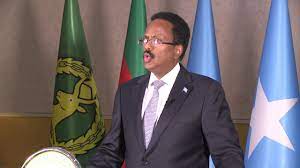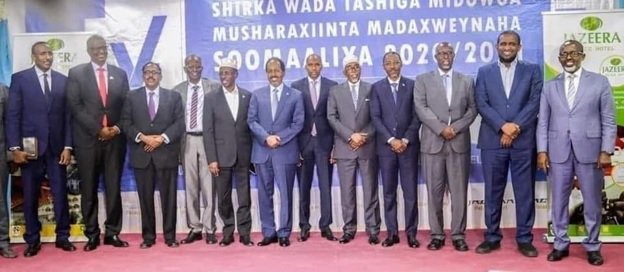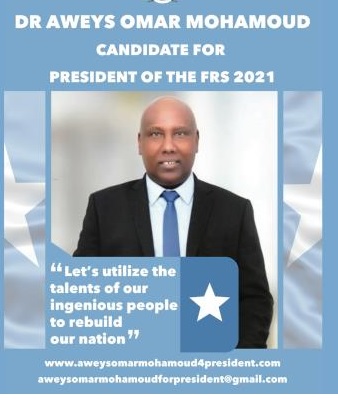Dr. Aweys Omar Mohamoud
Yes, Farmaajo is a dictator who abhors the rule of law, national and local democratic governance as stipulated in the provisional Constitution of the FGS. Yes, he has no understanding and no regard for the principles of the supremacy of the law, accountability to the law, separation of powers, and procedural and legal transparency. He also has no regard for the FGS’s judicial framework and its independence, no regard for independent media and citizens’ civil and political rights, no regard for the development and strengthenining of civil society and, more importantly with regards to the seriously delayed elections, he has no regard for the notion of electoral justice which aims to ensure that every action, procedure and decision related to the indirect electoral process is in line with the letter and spirit of the law so that citizens, including political competitors and those in opposition, can have confidence in the process or have legal redress to exercise their rights. Yes, he has no regard for any of the above laws and has violated every single one of them.

Farmaajo was unequal to the task of leading a conflict-affected and deeply divided country where there is a need for a serious and open-minded leader with the ability to reconcile groups, to address legitimate grievances and to prevent further polarization and conflict deterioration. His government failed to deliver a credible leadership to foster a sense of common national purpose. It failed to build legitimacy by connecting the government and the governed, and by exercising political power to enforce the rule of law, in the pursuit of justice. And it also completely undermined the consensus among political groups and citizens on democracy as the basis of our political system and the obligations that form the basis of state-society relations, such as human rights and social protections, and human freedoms and justice.
Our history of dictatorship provides us with real examples of what dictators do. They do not build institutions, but they personalize power through violence and intrigue, exactly what Mr Farmaajo has been doing for the nearly five years he was in office. His regime was marked by unpredictable arbitrariness, violence and terror, the absence of any explanation, the lack of any means whereby wrongs can be addressed and the inculcation of a widespread feeling of mental impotence and lethargy. Moreover, Mr Farmaajo attempted a naked power grab by using an extra-constitutional ploy back in April this year, a move that has spectacularly backfired on him.
Incidents of political violence committed by the Farmaajo regime are too many to count, but the most infamous of them include the attack on Hotel Maa’ida in Mogadishu where opposition leaders (including two former Presidents) were staying in the evening of 19 February 2021, and the armed assault on unarmed demonstrators and leaders the next morning; the put down of the protests in Baidoa in Dec. 2018 during the SW regional presidential elections where at least fifteen people died, following the arrest of Mukhtar Robow Abu-Mansour (the former al-Shabaab leader who defected to the government) who was an opponent of Farmaaja’s man for the job at the time; and the attempted political assassination of A. A. Shakur, a known opposition figure, and the slaying of some of his bodyguards in Mogadishu during the early period of Farmaaja’s reign in 2017.
Mr Farmaajo and his supporters do not understand how a history of dictatorship has shaped the path to our country’s collapse in the 1990s, and the role that that dictatorship had played as a cause and consequence of the violence and immense human suffering and social dislocation in Somalia today. They simply continue to be wedded to that failed ideology of centralization and totalitarianism by the late dictator Siyad Barre. It doesn’t matter to them at all the fact that Barre’s dictatorship led to the disintegration of the Somali state! Not one iota! They dispise the concept of FMSs (Federal Member States) as governing institutions created by their own communities to maintain security and provide citizens with their basic needs.
Who said ‘those who cannot remember the past are condemned to repeat it’?1 The dictatorial regime of Siyaad Barre preyed on its people; denied them all or virtually all fundamental human rights and civil liberties; eschewed or made a mockery of democracy; used force to compel obedience and achieve compliance with the demands (even whims) of the dictator; obliterated the rule of law and instead followed the law of the jungle; executed opponents and took political prisoners; carried out collective punishment of families and clans; waged wars against people in various regions of the country; was often capricious in its policies and actions; totally commanded the economy; inhibited individual prosperity; was seriously corrupt; was divisive, and nepotistic; selected people not on merit, but through political patronage; built the leaders’ personality cult, and created a culture of dependency and conformity; through corruption, incompetence and bad policies, people were starving across the country while the ruler, his family and close relatives and hangers-on lived luxuriously.
We now have a new dictatorship by Siyad Barre’s nephew, Mr Farmaajo. There was no one to restrain him over the past nearly five years when he has committed all the above high crimes and misdemeanors. High crimes and misdemeanors are criminal offences for which a President, according to our Constitution (see Article 92), can be removed from office through impeachment. They refer to criminal actions as well as any serious misuse or abuse of office, ranging from tax evation to obstruction of justice (think about Ikran Tahliil’s case). But there was no parliament to impeach Farmaajo because he emasculated it through bribery, corruption, incorporation and intimidation, from the get-go. And there will be no one to restrain him as he rigs the elections and makes himself the country’s president again, at a time and place of his choosing.
We know it all too well from our history that Farmaajo doing so will make it much more likely that unrest will smolder, leading to violent repression, resistance, and even a renewed civil war. Farmaaja’s plot is too easily predictable, and his acting is mediocre. The fact that such a second-rate self-promoter can get his way to fool and manipulate others to destroy our democratic constitution means that we have a long way to go before Somalia can create a genuine political community – a government accountable to citizens, and citizens under government.
More than two decades of dictatorial rule by Siyaad Barre has not helped the Somali people to develop the responsibility to create the organized institutional means of upholding and enforcing justice for all. There’s no reason to expect a new Farmaajo dictatorship will be able to do anything different or will not end in the same mass violence the previous one ended.
What to do?
Whatever other options there may be, my view is that all presidential contenders need to stand behind a Unity Candidate (UC) with a clear vision for democratic and peaceful Somalia through the development of legislative, executive and judicial institutions under the principles of the supremacy of the law and the Constitution.

The provisional Constitution is the supreme law of the Federal Republic of Somalia and the UC will be congnizant of this fact and his role within it. The President is the Head of State. Presidential powers are enumerated in Article 90. The President exercises a variety of competences, including legislative oversight; administration; regulatory competences; and judicial authority.2
The Constitution creates a two-level government and distinguishes two types of competences. Article 54 contains an exhaustive list of competences to be exclusively exercised by the Federal Government (Foreign Affairs, National Defence, Citizenship and Immigration, and Monetary Policy) while Article 50 recognizes shared competences between the Federal Government and member states based on the principle of subsidiarity. There are four main organs: the President, the bicameral Federal Parliament, the Federal Government, and the Constitutional Court. The system of governance is determined by the division of powers between these organs, exercised within the framework of the federal, republican and parliamentary political system.3

As well as having a working knowledge of the above Constitutional position and the need to ensure that these institutions have the capacity, resources and necessary independence to play their respective roles, the UC will set forth a clear vision of how he will address three key areas: improving governance; setting the foundation for a fully functioning federal system; and reforming the security sector. The only other thing I can think of is that the UC needs to have the capacity, the strengths and assets to determine his own policy directions, set his own priorities, and be able to leverage both internal and external resources for the rebuilding and reintegration of our nation. I will elaborate more on the issue of leadership capacity in my next article.
With other countries in the region on the verge of seismic implosion, we should not allow Farmaajo to kill the hope for peace in Somalia. Let unity be our watchword, and let’s stand together behind a single candidate with better ideas than Farmaajo.
Dr. Aweys Omar Mohamoud
For more info visit : Dr. Aweys’ Presidential Bid for 2021
———————
References
1. A quote attributed to George Santayana, a Spanish-American philosopher, essayist, poet, and novelist.
2. Kouroutakis, Antonios (2014) the provisional constitution of the federal republic of somalia: process, architecture, and perspectives, Cambridge Journal of International and Comparative Law (3)3: 1–13
3. Ibid., p.7
We welcome the submission of all articles for possible publication on WardheerNews.com. WardheerNews will only consider articles sent exclusively. Please email your article today . Opinions expressed in this article are those of the author and do not necessarily reflect the views of WardheerNews.
WardheerNew’s tolerance platform is engaging with diversity of opinion, political ideology and self-expression. Tolerance is a necessary ingredient for creativity and civility.Tolerance fuels tenacity and audacity.
WardheerNews waxay tixgelin gaara siinaysaa maqaaladaha sida gaarka ah loogu soo diro ee aan lagu daabicin goobo kale. Maqaalkani wuxuu ka turjumayaa aragtida Qoraaga loomana fasiran karo tan WardheerNews.
Copyright © 2024 WardheerNews, All rights reserved


